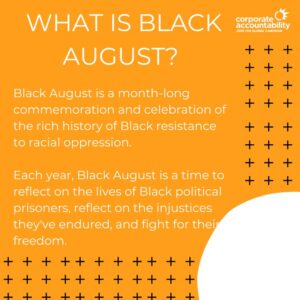Two years after the uprisings for racial justice in the summer of 2020, Black people are still being disproportionately and unjustly killed by mechanisms of the state.
Corporations and their interests play a crucial role in upholding, maintaining, and expanding these mechanisms. For example, corporations like the GEO Group profit heavily from mass incarceration, which disproportionately impacts Black Americans, while many more fund police foundations that are then supplying police departments across the country with the technology and weapons used to brutalize Black communities.
That’s why this month, Corporate Accountability is celebrating Black August, a month-long commemoration and celebration of the rich history of Black resistance to racial oppression.
Black August came about in 1979, behind the walls of San Quentin State Prison in California. It was started by inmates in memory of the deaths of brothers Jonathan and George Jackson, two revolutionary activists who continue to hold great influence in Black America today.
Over time, Black August has become an occasion to honor Black political prisoners — activists and people who have been imprisoned precisely for their political activities, sometimes in criticism of the U.S. government. Black political prisoners have also long been and are currently helping to advance the fight against corporate abuse.
For example, there is Mumia Abu-Jamal, former Black Panther and the preeminent commentator on the activist radio network Prison Radio, who has spoken about the Cochabamba Water Wars that took place in Bolivia between 1999 and 2000 in response to the privatization of Cochabamba’s water systems and supply.
Today, there are approximately 100 people imprisoned in the U.S. for their political activities and beliefs, with some having been incarcerated for decades. But, as this article published in Teen Vogue states: “…The definition of who is and isn’t a political prisoner becomes less relevant when the violence of the prison system is laid bare.”
The horrors and injustices of the U.S. prison system are well-documented, and as we know, it’s Black people and Black communities that are disproportionately being targeted and affected by the prison industrial complex. Regardless of why a person is incarcerated, they are often subject to mistreatment, coercion, and exploitation at all levels – from injustices in the prison telecommunications and commissary systems to inmate labor.
In fact, in the wake of the BP oil spill in the Gulf of Mexico, the oil and gas conglomerate used inmates from the Lafourche and Terrebonne Parishs’ Work Release Centers in Louisiana to clean the oil. In these majority white communities, the cleanup workers were almost exclusively African–American men.
The systemic change that Corporate Accountability strives for cannot be achieved without dismantling the systemic racism that allows racial injustices to continue. We believe that we can, in fact, follow and support the liberatory politics of Black leadership today that can help dismantle all systems of oppression tomorrow. And as a committed supporter of Corporate Accountability, we hope you’ll join us in observing Black August.
If you’re not sure where to start, we highlighted Black prisoners who are prominent figures in the movement for Black liberation or have active campaigns, which you can support below.
Individual political prisoner websites:
- Mumia Abu-Jamal
- Sundiata Acoli
- Veronza Bowers Jr.
- Ruchell Magee
- Rev. Joy Powell
- Mutulu Shakur
- Russell “Maroon” Shoatz (in memoriam)
Books to read:
- Soledad Brother: The Prison Letters of George Jackson (1970) by George Jackson
- Blood in My Eye (1971) by George Jackson
- Jailhouse Lawyer’s Handbook published by the Center of Constitutional Rights
- If They Come in the Morning: Voices of Resistance by Angela Davis







